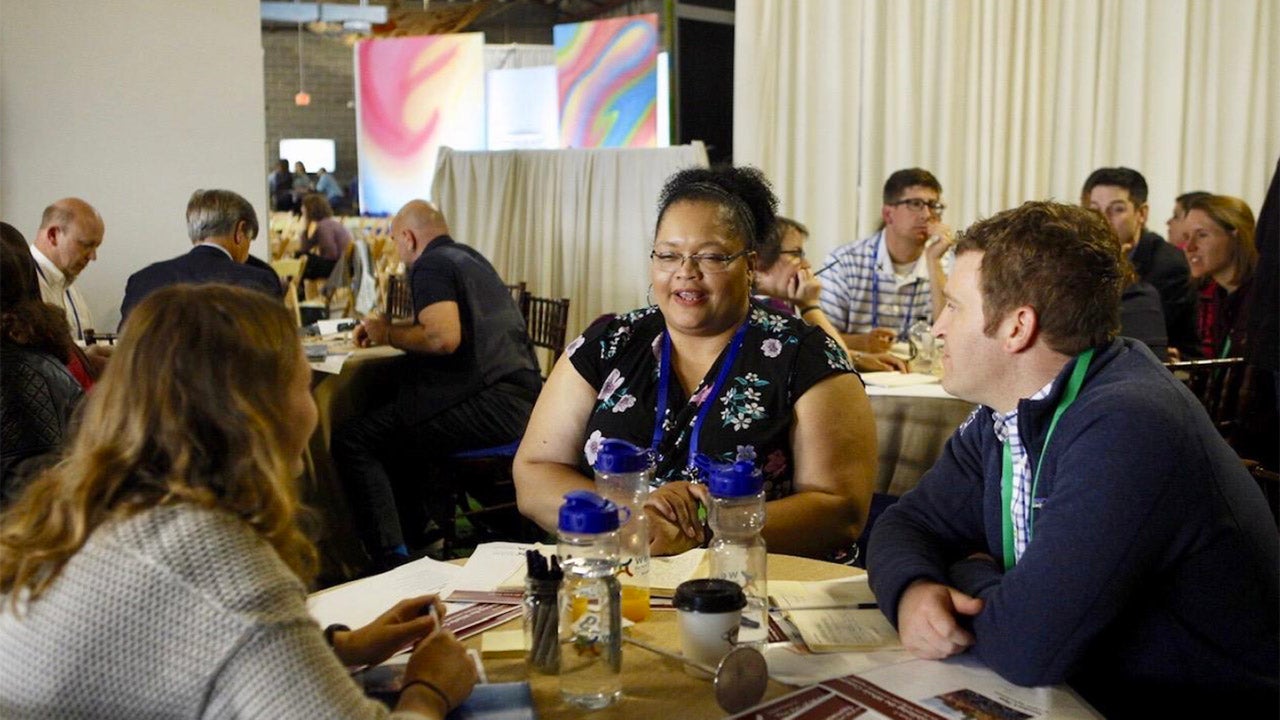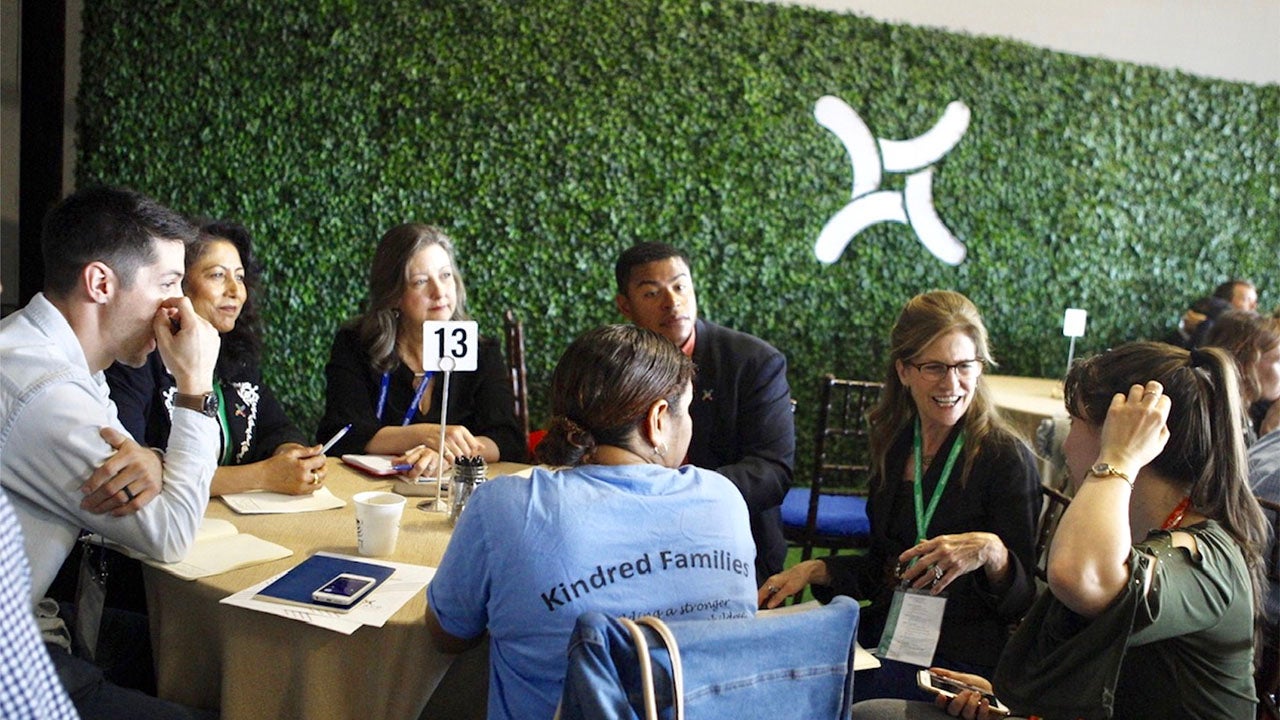Jessica Disu was eight when she first realized she was black. She never saw herself as different from her white foster parents until a playground conversation. “My parents told me that we have to be nice to you,” a girl told Disu, “because you are adopted.”
Disu — a peace activist from Chicago who describes herself as a “humanitarian rap artist” — was sharing her story with a crowd from across the country at the first #WeaveThePeople gathering in Washington, DC, hosted by the Aspen Institute.
The other kids knew she wasn’t part of her family biologically, Disu realized, because her parents had a different skin color. “That was my first time seeing color,” she said, “and having consciousness of my race.”
Disu and others helped open the gathering by sharing the stories that led them to become “weavers,” people working in their communities to heal America’s social fragmentation and isolation. Weavers look beyond difference to see the whole person. They treat their community as their home and work to make it as loving and welcoming as possible. They are weaving an inclusive social fabric.
For Disu, that means mentoring young women in Chicago and healing souls with poetry. For other weavers at the gathering, it meant opening a youth center for at-risk kids, working to end homelessness among veterans, or inviting neighborhood children into their homes for food, play and support.
LB Prevette of Wilkesboro, NC, in the foothills of Appalachia, helps organize a monthly gathering called Teens on the Green and has created an LGBT youth hangout in partnership with faith-based organizations from the region.
Tragedy pushed Sarah Adkins, a pharmacist in Athens, Ohio, to become a weaver. “I had a wonderful life,” Adkins told the group, “a very humble life. We were raised in a church, a loving family — I was given the foundation to be successful in life.” Then one day, she came home from a trip and found that her husband had killed their two children and then shot himself.
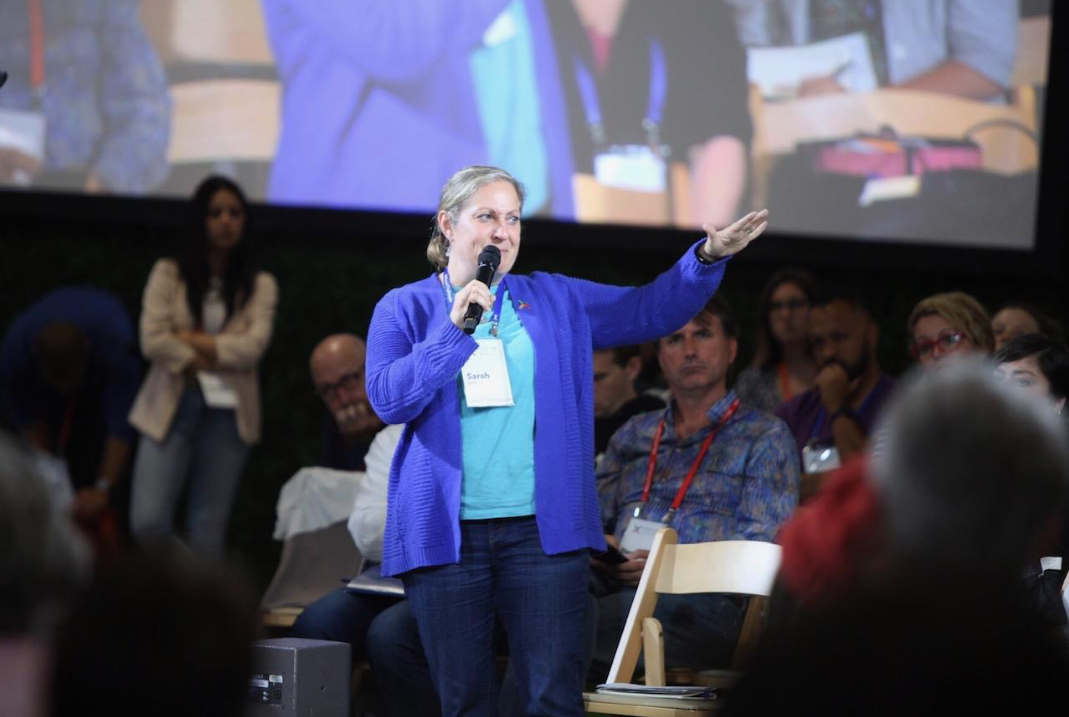
“This is my burden to bear,” she said through tears. “and that is OK. A good day for me is if I can help one person, even if it’s just a smile or helping a student. That is really all I need. I know what I can touch, that’s within my arm’s reach.”
“There are founding moments when people come together to begin a job,” said David Brooks, the executive director of Aspen’s Weave: The Social Fabric Project. He cited a gathering at Seneca Falls that launched feminism and one at Port Huron where Students for a Democratic Society launched the New Left. The job now for this group, he said, is to heal a broken, divided society by shifting this country’s values.
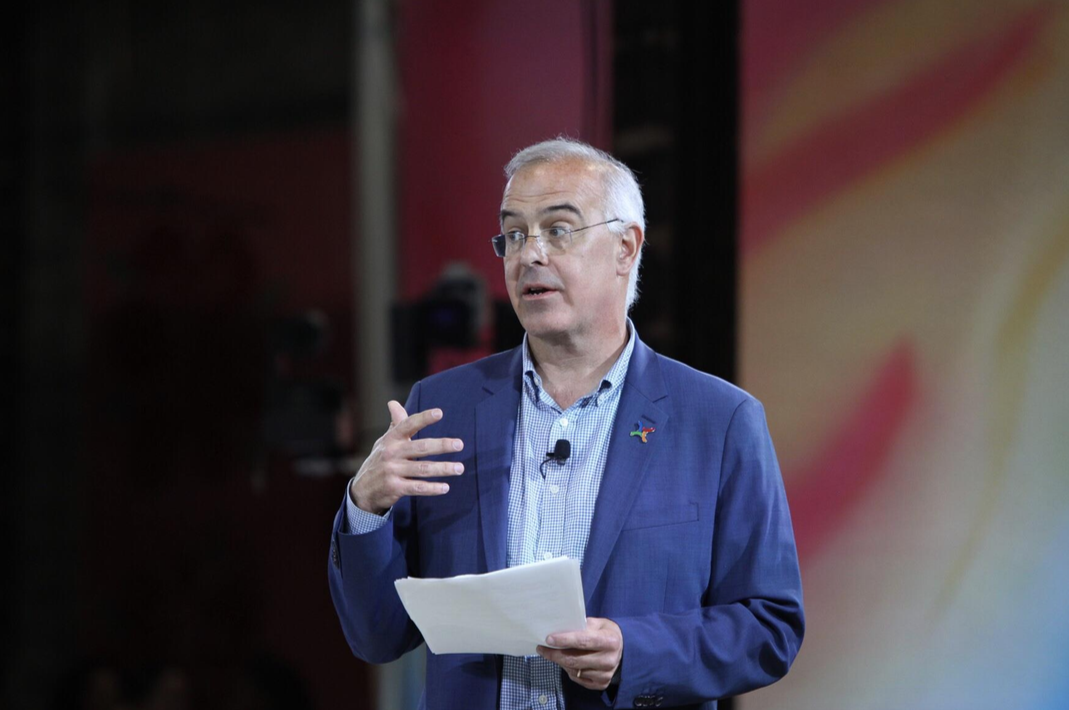
Weavers put “relationship over self,” Brooks said. They resist the hyper-individualism of modern culture that has brought an epidemic of loneliness, social isolation, and despair. Weavers practice “radical hospitality” and “radical mutuality.” If someone knocks on their door, they always welcome them in; they don’t see themselves as separate from or better than others, but as equals. “I don’t do things for people,” one weaver told Brooks, “I do things with people.”
Many at the conference rose to share the values that motivate them — neighborliness, love, empathy, compassion. One said her prime value was “hashtag GSD” — getting sh-t done.
“How do we take your example and change the culture?” Brooks asked the crowd. “We don’t know exactly how to do it… that’s why we’re here. To talk about it and see if we can figure it out.”
One of the deepest divides in America is race. John Wood, Jr., the director of media relations for the organization Better Angels, talked about the need to confront our history of racism and its continuing power and impact. “It’s one of the great challenges… maybe the great challenge of American history.” He said, “we need to take moral responsibility for our past.” His organization works to find ways to help people love and empathize across the racial and ideological divide.
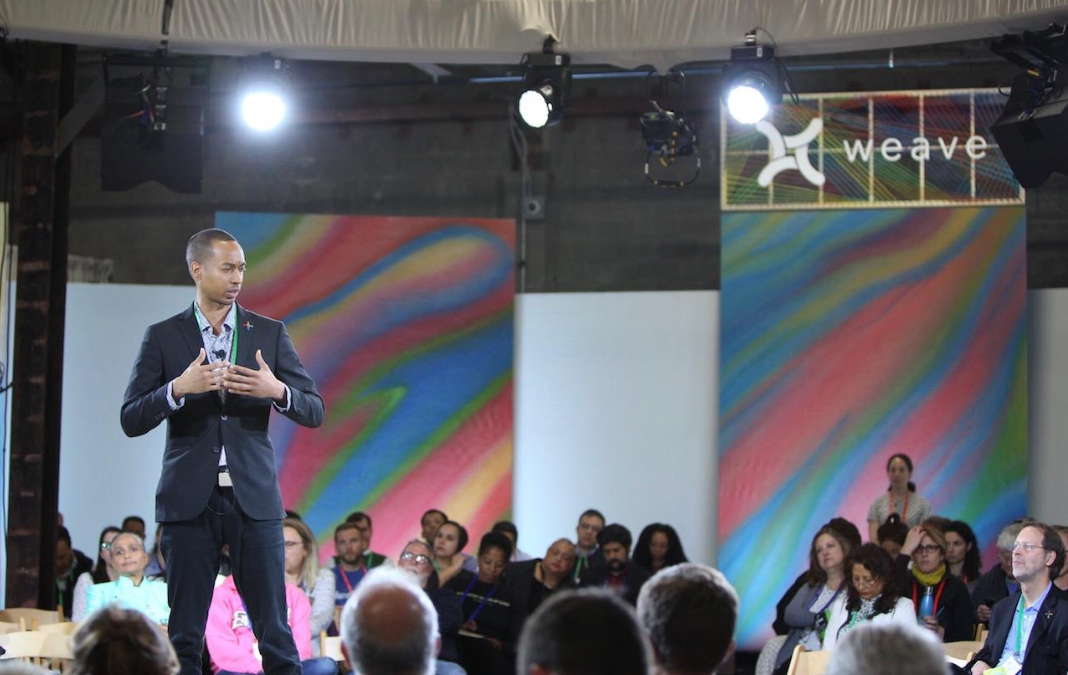
But finding love is difficult, said Traci Fant of Greenville, SC, in the face of continuing injustice. “We love being in this room right now, but at the end of the day, we are still going to be black and still be called nigger and still be disrespected.”
Fant, who grew up in Detroit and later founded the organization Freedom Fighters in Greenville, said she didn’t experience racism until moving to South Carolina, where she is an activist. She said she appreciated the Weave message of building relationships and community connection, but wanted to see it more in action. “I want to feel the love we’re talking about,” she said. “Because, even here, we’re segregated… I teach my kids when you go into lunchroom, don’t just go sit with black kids.”
Jahmal Cole, an author and activist in Chicago, called on people to face the ugly realities of racial injustice today. He said we shouldn’t accept life in communities of color as being normal, or regular.
“It’s not regular for you to walk into pharmacy and have all the cough syrup locked up,” he said. “It’s not regular for every billboard in my community to say ‘cheap divorces’ and ‘$6000 tax advances’ … It’s not regular for kids in Chicago to go to the bathroom and ain’t no toilet paper, they got to be learning in filth.”
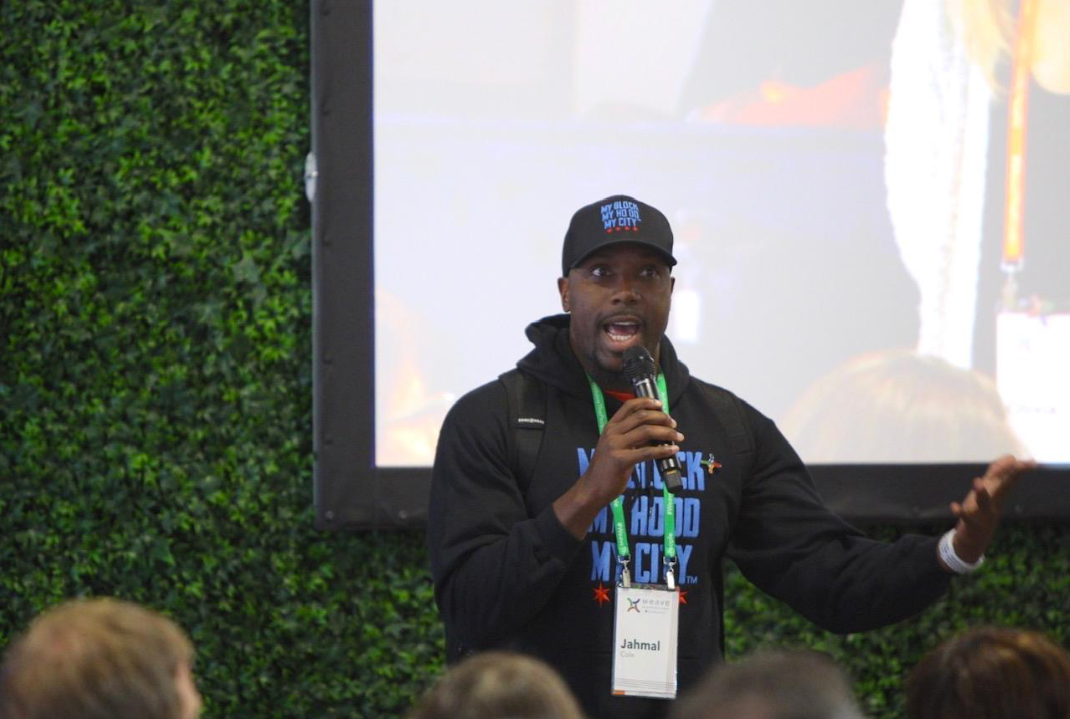
“The integrity of our country is at risk,” he said. “To make our country better, we need more people to step outside their comfort zones and expose themselves to different cultures, different communities, and different perspectives.”
Discomfort is a precondition for growth, Brooks said in wrapping up the first day of #WeaveThePeople. “We are what we are, and American society is what it is. Sometimes it takes a sledgehammer to open up a new level of consciousness. And that feeling of uncomfortableness is part of the process.”
On Day 2, the group moves from recognizing our shared values and challenges toward action, with discussions on how best to weave a new inclusive social fabric.
